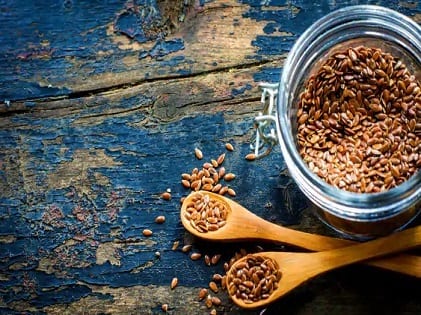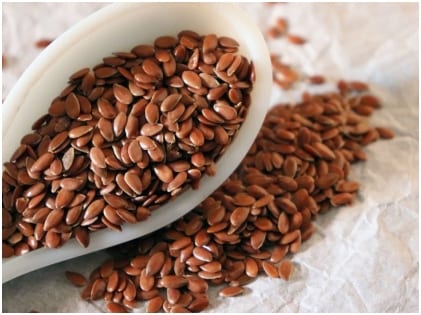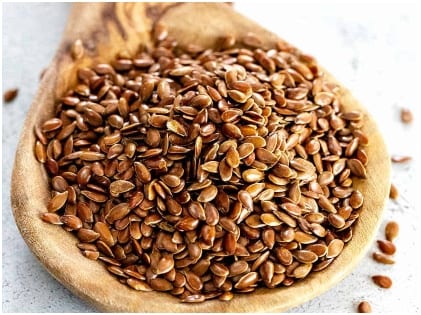The flax plant is one of the oldest crops in the world. Those tiny edible seeds from the plant have now gained ‘superfood‘ status and for the right reasons. Packed with nutrients, these nutty seeds emit an earthy aroma. And the best part is that you can procure it in both whole and ground form with ease.
Experts have time and again advised the importance of including a handful of these in the daily diet, and not lots! Think of bread, juices, shakes, breakfast cereals, and you will know how you must incorporate these seeds that will refill and boost your nutrient levels. What are the health benefits of flax seeds? Read on to know.
High In Nutritional Value
 Flax seeds are great sources of antioxidants, omega-3 essential fatty acids, and a generous amount of magnesium, phosphorus, selenium, copper, fiber, and vitamins B1 and B6. There are ideally two types, golden and brown- both of which are highly nutritious.
Flax seeds are great sources of antioxidants, omega-3 essential fatty acids, and a generous amount of magnesium, phosphorus, selenium, copper, fiber, and vitamins B1 and B6. There are ideally two types, golden and brown- both of which are highly nutritious.
One typical serving of ground flax seeds (about 7 grams) would supply the rich balance of nutrients. This includes proteins, carbohydrates, fiber, fat, vitamin B1 and B6, calcium, iron, magnesium, potassium, and phosphorus. However, most people believe that the seed’s health benefits are because of the omega-3 fatty acids and fiber content.
Replete With Lignans
It might be of interest to learn that flax seeds come loaded with 800 times more lignans than most other plant foods. Interestingly, lignans are plant compounds that have estrogen and antioxidant properties, which lower the risk of cancer by several notches.
Even studies show that women who consume daily flax seeds are less susceptible to fall prey to breast cancer, especially after menopausal. A Canadian study conducted over 6000 women revealed that flax seeds eaters are 18% less likely to be diagnosed with breast cancer. A recent study on 15 men who had 30 grams of flax seeds every day along with a low-fat diet had lower rates of prostate cancer.
Controls Blood Sugar Level
 Globally, Type 2 diabetes is a major cause of concern. High blood sugar levels are a result of the body’s inability to produce insulin. Or it’s resistance to the secretion. However, flax seeds promote insulin secretion, which would immensely benefit such patients. According to research, people with Type 2 diabetes, experience a drop in their blood sugar levels.
Globally, Type 2 diabetes is a major cause of concern. High blood sugar levels are a result of the body’s inability to produce insulin. Or it’s resistance to the secretion. However, flax seeds promote insulin secretion, which would immensely benefit such patients. According to research, people with Type 2 diabetes, experience a drop in their blood sugar levels.
The research found that adding 20 grams of flax seeds or ground powder in the everyday diet for a month reduces around 15% in their blood sugar levels. This lessening capacity is mainly due to the seeds’ fiber content and in an insoluble form. Going by research, it is the fiber that minimizes the release of sugar in the blood. And it thereby reduces the blood sugar levels and helps you stay healthy!
Controls High Blood Pressure
Flax seeds reduce high blood pressure too. As per a Canadian study, intake of 30 grams of flax seeds for six months lowers the systolic and diastolic blood pressure by almost 10mmHg and 7mmHg, respectively. Those using medication to control pressure levels will benefit immensely from these seeds in their diet.
It would mitigate the issue altogether. A large review from data collected from 11 studies shows how flax seeds consumption for three months and more would reduce the pressure levels by 2mmHg. If this seems too insignificant, remember that this mere 2mmHg reduction is enough to prevent a stroke by almost 10%. Besides that, it also reduces the risk of cardiovascular diseases by 7%.
Prevents Weight Gain
 Snacking between meals is fairly common. Supplementing the diet with flax seeds is a wonderful way to keep off those hunger pangs without bothering about putting on weight. Data from a study shows that 2.5 grams of ground flax seeds or powder can diminish hunger. It will, in other words, reduce your hunger or appetite build-up.
Snacking between meals is fairly common. Supplementing the diet with flax seeds is a wonderful way to keep off those hunger pangs without bothering about putting on weight. Data from a study shows that 2.5 grams of ground flax seeds or powder can diminish hunger. It will, in other words, reduce your hunger or appetite build-up.
The soluble fiber content in the seeds that slows down the digestion process inside the stomach. It triggers numerous hormones that take-control of the appetite. It thus helps you feel full and as a result, you consume fewer calories.
Inclusion of flax seeds in the diet would remarkably benefit the body in more ways than one. Adding the same to your diet in the mentioned proportions would produce results, if not instantly, but later. The best thing is, you can even find it in your nearest supermarket. So, go on and find interesting recipes to add these wonder seeds to your everyday diet!
